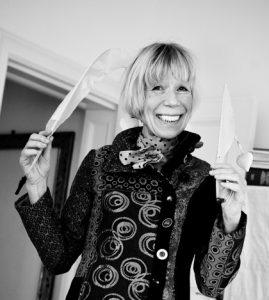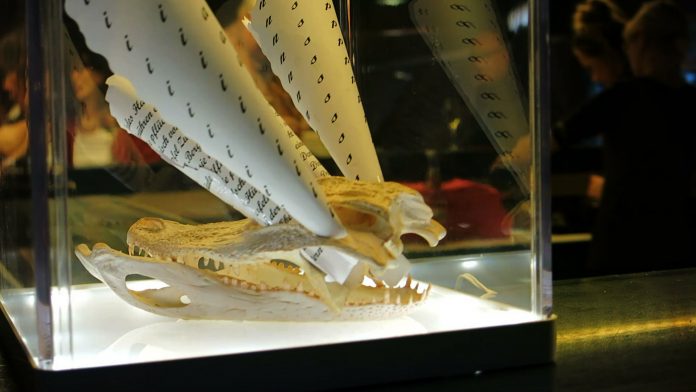(THIS ARTICLE IS MACHINE TRANSLATED by Google from Norwegian)

The archive of the Akademie der Künste (Academy of the Arts) in Berlin is considered the most significant interdisciplinary archive of art and culture after 1900 within the entire German-speaking world. The German surrealist Ginka Steinwachs (b. 1942) has been depositing her diaries in the archive since 2003. May 17 this year, the archive officially opened with an exhibition of installations made by Steinwachs. On that occasion, Ny Tid had a conversation with the poet.
In the introductory lecture "News from the hunt" did they describe diaries as gymnastics – the author's "warming up"?
“Yes, it is about training the thought muscles in terms of words and sentences. The diaries are the morning gymnastics of writing. But also drains for emotions – a form of garbage dumping. The diaries are not only navel-gazing, they also contain many literary drafts: Diaries are something that is kept. They are art documents – DokuArt. A tram driver has a tram driver's certificate. Keeping records of one's life requires thought. One cannot move in red over the intersections of thought. Wait for the green! ”
Steinwachs has warmed up a lot over the years: She estimates that the ratio of the diaries to the published works is about four to one. Since she has published about 25 books, there should be a three-digit number of diaries.
One cannot move in red over the intersections of thought. Wait for the green!
Object faithful
On the occasion of the archive, Steinwachs made several installations. The method is to find an object that stands out, a so-called objet trouvà ©. Duchamp (he with the pissoar) referred to such objects as "readymades". Later the method was adopted by both the Dadaists and the Surrealists. Steinwachs cites his business card as an example. It is glued to an S-Bahn ticket: "Ginka Steinwachs – always dictates in the direction of travel!" In the diaries she has in several places pasted tickets and made small poems around them, for example a page with variations on the word "ticket".
But of course Steinwachs has his own technique for finding objects. GL-Ü-CK (Suhrkamp, 1992), which bears the subtitle Original Forgery, states: "I have never sought anything other than what was found" – in French: Je trouvaille, a linguistic innovation of travail-
laughs – "to work" and trouvaille – "object discovery".) "The whole plot she found in five lines about love's growth and fall in" Playing in the Theater "in Goethe's Faust. In André Birch's translation: "You are approaching at random; something offers / your soul to become; soon you are in the spin. / First, happiness grows, then it will flow / From the river of joy to the ocean of pain / And before you know it, it's a novel. ”Steinwachs worked out“ found ”surrealistically for a book on 140 pages.
One of the installations is entitled Quadriga Crocodile. It consists of described rolled-up sheets of paper inserted into the skull of a crocodile. Quadriga (Latin "four-span") denotes the four classic modes of interpretation of the Bible: literal, allegorical, tropological (applied to the individual) and anagogic (concerning the last things). In Steinwachs' installation, the quadriga is transformed into a surrealistic meeting between a prehistoric animal experience and texts – a picture of the monstrous of all literary interpretation? This redeployment of an objet trouvé is not only an emblematic example of artistic method, but also provides associations with Steinwachs' first (city) novel Marilyn Paris. There, the botanical garden and Buffon's (1707 – 1788) natural history play an important role.
Extensional authenticity
Long before post-structuralism was officially presented in Germany by Manfred Frank in 1984, you satirically depicted in the assembly novel MarylinParis in 1978 Lévi-Strauss, Foucault, Deleuze, Roman Jakobson, Lacan, Derrida, Althusser, Michel Serres and Barthes. The structuralists and the post-structuralists were confronted by informers such as Buffon und Brillat-Savarin – albeit in surrealistic form. Only at the end of the 90 century did postmodernism become seriously discredited and enlightenment regained its sails. Did you foresee these developments?
"No, how could I?" Steinwachs replies modestly. Yet Steinwachs' authorship represents an interesting alternative to the stiffened contradiction between postmodernism's gay falsus and the longing for existential authenticity.

AutoRbiografi
What kind of autobiographical project do you really have? It does not resemble any autofiction à la Knausgård.
"Out of autofiction, I create autoRfiction ..."
So a new word. Does it mean a fiction about the author, the author's fiction or a metafiction about the author as a writer?
"As you will! The word "autofiction" itself is an example of my method: Possible letters are tested, and the ones that fit – that is, those that taste and thus have a new meaning value, remain standing. This new meaning is crucial. I taste myself, which is why gastronomy and Brillat-Savarin are an important theme already in my first novel. ”
The name seems to be very important to you, more than biographical data and memories. For example, the stone becomes a metaphor for poetry: To dictate is like the tongue's play with a stone in the mouth, you write. The stone grows into poetry – Stein-Wachs!
"They are right. I was baptized Gisela, but early called Ginka. The first name also has many possibilities, with links to I Ging, the Chinese book on the transformations, and also to gingka, the ginkgot tree in its female form, whose magazine Goethe, by the way, wrote a famous poem about ... »
Do you tend to perceive language – and thus yourself – as a sonic phenomenon?
"In person in Latin means "the one through whom the sound passes", it is a person. Personare is "to tone through". Man as a mask (person) must therefore be understood as the part of man that is heard. This observation, moreover, stems from Roland Barthes, and not from me. ”
To save the language, I treat it like a berserk.
Language and rooms
On the other hand, they also have a spatial perception of the words. They talk about cleansing the language like a kind of washing woman (Sauberfrau). Through sound similarity, you connect this to practicing language magic as a wizard woman (Zauberfrau). Why treat words like objects in space?
“My spatial perception of language depends primarily on the oral cavity understood as a space. Besides, the language is a room for memories, a house of memory. Finally, the language is both dictionary and punctuation (WörterbRuch), I break up words that break stone – the words are broken into pieces. To save the language, I treat it like a berserk. "
After all, there are also wordless words without insight, as in the bad rhyme. Freud and Lacan argued that the subconscious used sound similarities or associations between "word representations". But does your wordplay seem to be consciously constructed?
"Yes, you could call it a conscious deal with the unconscious. A combination of automatic typing with a construction of the typewriter (myself and above) – a machine that almost always thinks and prints. ”
So is there a relationship between sound similarities and the spatial nature of language?
"Yes, one example is the sound similarity between" dream "(Traum) and" room "(Raum). The dream is spatial, and this becomes clear through the pun. ”
This is almost impossible to recreate in Norwegian. Is that why you are almost only known in Germany?
"You can't really translate my lyrics, they have to be rewritten."
Dr. Steinwachs, we thank you for the conversation.


